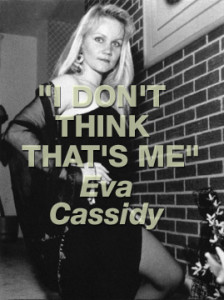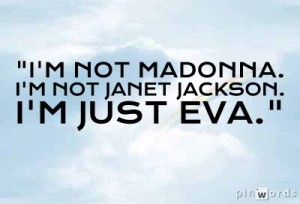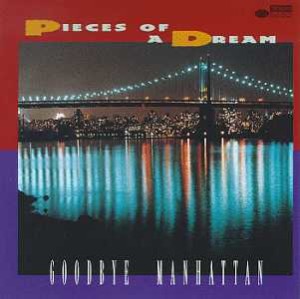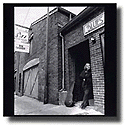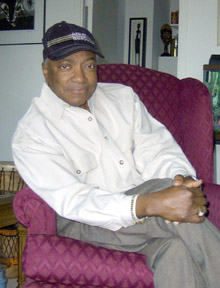 INTRODUCTION: Al Dale recently retired from the National Park Service, where he was the Chief of Public Events in Washington, DC. From 1988 to 1996, he was also Eva Cassidy’s manager, booking her into clubs, providing support and encouragement, and trying to get her a record contract. When those efforts failed, he persuaded Eva to make a live album which they entitled LIVE AT BLUES ALLEY. Laura Bligh interviewed Al Dale in the summer of 2001.
INTRODUCTION: Al Dale recently retired from the National Park Service, where he was the Chief of Public Events in Washington, DC. From 1988 to 1996, he was also Eva Cassidy’s manager, booking her into clubs, providing support and encouragement, and trying to get her a record contract. When those efforts failed, he persuaded Eva to make a live album which they entitled LIVE AT BLUES ALLEY. Laura Bligh interviewed Al Dale in the summer of 2001.
Question: How did you meet Eva Cassidy?
AL DALE: I first met Eva at Chris Biondo’s studio. I was there picking up some tapes, a group I was managing at the time had done some recording there. When I got there, Chris was in a recording session, so I just sat in the booth with him, and I heard this incredible voice. Chris said something like “Man, you’re not gonna believe this Eva Cassidy, you’ve got to meet her, she’s something special.” She was doing a backup vocal thing, she was laying some tracks for that, and then when she walked out he said “That’s Eva.”
I said “THAT’S Eva?” I was floored, first because I had predetermined that she was black, and two, I just didn’t know she was going to come out like… like Eva.
Question: You had a mental image of someone who’s probably more like Ella Fitzgerald.
AL DALE: Exactly, such a big voice comes out of this little box, you know, it was just incredible. So that was my introduction to Eva, I had the chance to meet her that day, we just had a little two-minute conversation and then I left. Then later on we got to know each other. I mentioned to her that I thought she was really really great and she had a future in the music business. Of course Eva was sort of like, “Well, I don’t know about that, I’m not sure,” and then she said “Well, tell me this, why would anyone want to buy MY music?” After that I would hear her every now and again at Chris’s studio, and then we started to talk about her career and possibilities, started to come up with a game plan about the kind of music she would do, that sort of thing, and Chris was talking to her about putting a band together.
Question: What were your first steps?
AL DALE: The first steps were just trying to get her used to the idea of performing. She hadn’t been into clubs that much, and the only bands she ever performed with were in high school and this group Method Actor, I never did see that group perform live. So the first step was getting her the confidence that she could go out and perform, because she was really shy about that, I think it was more — shy is not really a good word to describe it, because even though Eva was shy she still had sort of like a strong constitution, you know what I’m saying? People can misunderstand that, misjudge it, and take her shyness for weakness. Yes, she was shy, but at the same time she was very intelligent, she had this spirit about her. She had SOME idea of what she wanted to do, she just didn’t know how that would fit in terms of the music scene, “Can I make it, with what I want to do?”
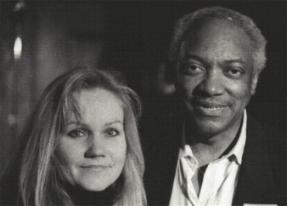
Question: And that was the challenge.
AL DALE: That was the challenge, because she wanted to do a little bit of everything. Her range of music, in terms of what she liked, was broad. She could like Ella Fitzgerald, Stevie Wonder, Ray Charles, Joni Mitchell, all at the same time. Usually an artist gets into one genre or another, like R&B, or pop, or folk, or whatever, and I think the idea that she could pull it all off was more of a challenge to her than anything else. I think that just singing blues, or folk, would become boring to her after a while, because it would come so easy. I think a challenge to her was the fact that, you could say “Eva, can you do a Janis Joplin note?” and she would belt it out, she’d just DO it, I think the challenge to her was “Let me do a little bit of everything.”
Question: It was important to her to get the style right, to bring something of herself to each song.
AL DALE: Exactly. If she was doing a folk song, she would make it an Eva folk song. She was able to take a song that someone else had done, and not imitate it verbatim like some artists would do. Eva had a way of listening to that song and then interpreting it her way. She had the ability to take old songs, and maybe they were hits and maybe not, and turn them into Eva songs. That was really her gift, a tremendous sort of talent that she could just do all these different kinds of music and make them all sound like that was what she did best. That was intriguing to me. Now the next part was trying to harness that. What do you do, where do you go, to try to make a music career out of this?
Question: Eva told me once that she loved to be in the recording studio, and that she wished she could have a singing career without having to do any concerts.
AL DALE: (Laughter) She would say something like “If I could just record, and I could do some of my art stuff, I could paint, do my seashells.” At one point she said to me, “I would just like to be able to make enough money in my music to be able to do all the other things I like, and have the music be the kind of thing that would allow me to do that.” She’d like to have a little house somewhere, maybe near the water, be able to paint in her spare time. That’s where she was heading in her own mind, I don’t think she was looking to become this diva, this rich person.
Question: She wasn’t looking to attend the Grammys in a sequinned dress.
AL DALE: I think to go up there and accept the Grammy would be the last thing she would want to do. Other artists would gravitate to that, that would be one of their main motivations for doing what they do. Eva didn’t care for the glitz, that’s the part of show business that was hardest for her to deal with, the fact that “IF I do get ‘famous’ then I’ll have to do all those things possibly that I detest, and I don’t want to have to get all dressed up and go smooch with that person, do all of that, I’d rather just sing, record, and then go do what I like to do.” Unfortunately in the music business, it’s very difficult, it’s one of the things you can’t do. There have been a few stars who like hibernate, and go away, and you wonder “I don’t hear anything about this person,” well, there are very few. She was interested in the music, making it the best it could be and then moving on. Especially because she was young and pretty, the expectations would have been that she would be doing certain things in her career she wanted no part of. They’d want to dress her up, put her in a little spandex, tease her hair, put on
all the makeup and everything, say “Here you go.”
Question: She would have looked fantastic but she wouldn’t have been Eva.
AL DALE: Exactly. One day, we went out to get some pictures done. I said “Eva, you’ve got to dress up for this picture, this is going to be your promotion picture,” and she said “Well, what do you think, what should I wear?” I said a dress, maybe like black. She said “I have this one dress that I kind of like, maybe that would work,” I said OK, let’s try it out. So she got all dressed up, and I mean, she was a knockout. Coming from Eva in the jeans and the big baggy jacket, all of a sudden here she is in this little black mini-dress, all made up, hair all done, and she looked gorgeous. I said “Eva, look at that, you look fantastic,” and she would go, “Mmmmmm, I don’t know, when are they going to take the picture….” So we used it for a second, I had a few prints made up, but she didn’t really think that was her, she said “Nice picture, I don’t think that’s me.” So we ended up using just a head shot, that became the picture I would send out to record labels and so on. She had the looks to be Eva Diva, if that was the route she wanted to take.
Question: What were some of the ways you helped Eva become more comfortable on stage?
AL DALE: When she was doing the first gigs with the band, Keith Grimes, the guitar player in the band, would go out and say everything, he would introduce the band, he would talk about the songs they were going to do, and Eva would just stand back, then she’d step up and belt out the tune. Usually you would expect the lead vocalist to be the master of ceremonies. I would talk to Eva about that, she would say “I’ll work on it.”
One day we decided to work on it together. I said “I’ll videotape you and you can look at it, I’ll give you whatever advice I can about what you can do on stage,” and so she was a little reluctant, but she said “Let’s try it,” so I set up the video camera, and we played the music and were practicing dance moves to do on stage. I talked about how you can move from one side of the stage to the other and not be stationary, and if you were at the mike or were playing the guitar, you could just move around a little bit, there were certain things I was telling her she could do. I was thinking at this point, how everything in the music business was going, you had to have some sort of glamor to it, you had to get on board with what the music industry was all about, and probably still is all about, and so I thought that would be one of the ways she could get a foot in the door.
We spent an hour, two hours, finally she said “Al, I’m not Madonna, I’m not Janet Jackson, I’m just Eva, I don’t think this is gonna work, I don’t think this dance thing is gonna go.” I said “Eva, one thing is sure, you really don’t HAVE to do any of this stuff.” I told her about Johnny Mathis, I used that as a sort of example. When I see Johnny Mathis on stage he just sings, he comes out, he doesn’t try to tell funny jokes, he just says “Ladies and gentlemen, welcome,” and he sings. And at the end of the show he says “Thank you.” I said “You can do the same thing, you have the kind of voice that you can just come out and sing and people will be perfectly happy. You can have a certain part of the show where you bring a stool out, you can sit on the stool, and then we can get a spotlight that will be on you, you can play the guitar, the musicians will be in the backdrop, so we talked about that sort of thing.
Question: So you had to adjust your strategy?
AL DALE: We adjusted. I said “Let’s take this thing another step and see how we can do it in a way that you feel comfortable. If you’re comfortable it’s going to show, it’s going to come off on stage, and then you’ll be a lot happier in what you are doing.”
So gradually I started talking to her about what she could do on stage, and I had to say to Keith, pull back a little bit, she’s never going to feel that she has to carry the weight if you’re always going to do it. So Keith started to pull back and Eva would say more and more. I said “Eva, you don’t have to do anything except say the name of the song you’re going to sing. You can say this is my favorite song, I grew up with this song, or whatever, you don’t have to think of anything, you don’t have to have anything written to try to remember, just say what comes naturally.” So she started to do that on stage, gradually she started to introduce the songs and the band members, and at the end of the set she’d say “We’ll be right back.” And that was progress for Eva. Big steps. (Laughs.)
In fact, the guys started to realize that Eva was coming out a little bit more, in rehearsal she was being a little more forceful in saying what she wanted to rehearse, that sort of thing. Before, it was what the band wanted to do. It became, what Eva wanted to do.
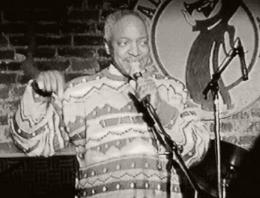
I think by the time we did the Blues Alley CD, she was ready. If you listen to LIVE AT BLUES ALLEY the way it was originally recorded, her introduction of the songs and the things she said, were all kind of natural things, “I want to thank my father who taught me to play guitar,” the things she said, were all things we didn’t discuss in terms of “What are you going to say on stage,” but “Be natural.” She was getting the hang of it. It was like watching this beautiful little flower come to life, it was really good to see that sort of thing happening, coming from deep within herself. It was an effort for her to get there, she had to work at it, and she did it at her own pace.
One thing I learned working with Eva, in terms of management style, I didn’t have to go hype her up, always trying to make thing bigger than life. We’d talk about “what would you like to do, how would you like to see it happen,” I’d make a suggestion here and there, but then try to take it at her pace. If I had tried to push things, tried to make it a traditional manager-artist relationship, I don’t think it would have worked. I don’t think Eva was ready for any of that kind of stuff. I’d say “Eva, take your time, I have supreme confidence that you can do anything you want to do,” and then sometimes she would give me that little laugh, you know, that she had, and she’d go “Oooooh, I don’t think so,” and I’d go “Let’s try it,” and then gradually it would happen. And I would say “It was great,” and she’d go, “It was better. It was better.”
So she had her chance over a number of years to just mellow into it, and get to the point where she was comfortable on stage, and I think right at the very end, at the Blues Alley release party date, she was getting comfortable. I remember I asked her if she was going to autograph the CDs, and she said “Where am I going to set up?” I said “Over by the stage, inbetween the shows they can come up,” and under normal circumstances she would not have been comfortable with that. I think she realized, you know, “People do really kind of like me, they’re coming up to see me, they’re responding,” and that started to sink in, because at the beginning she just never figured there was any reason for people to really like her that much. So she stayed there and she signed the CDs and everything, it was nice to see that part of her come to life.
Question: You would arrange for record company people to come down to see Eva. Can you tell me about some of those, and what did and did not come of it?
AL DALE: The first couple of times I sent material out to record labels, I would get a letter back saying “We think she has a nice voice, but at this time we’re going to pass,” it would be that kind of thing. And that went on with a couple of labels. Then Bruce Lundvall, up at Blue Note, said “She sounds interesting, I’d like to pursue it a little farther,” and we made arrangements to go to New York and meet with Bruce in his office. Eva took her guitar, and while we were there he asked her if she would play something for him, and when she finished he said “Eva, that was wonderful, that was marvelous.” He decided that what we needed to do was to make some demo things, so we had a demo budget, which means that a record company gives you some money to go into a recording studio and record some stuff, three or four songs, and they’ll evaluate it from there. So in putting together this tape, Eva did what Eva does, she had four songs, each one was different, Chris recorded them in his studio. So Bruce Lundvall said “Well, you know, Al, I hear her, I really don’t know what to do, where to go with this, but I’m still interested,” and so that sort of passed.
In the meantime I talked to some other labels. Apollo Records in New York had just started a label. Oliver Sutton, who was the manager of WPLS radio in New York that was owned by the Suttons, sent some people down to DC, and they met Eva, heard Eva. Eva brought over some of her artwork, I had asked her to bring some stuff along because one of the guys from Apollo was into the art stuff, he had had exhibits in New York and I wanted him to see some of Eva’s paintings. So we met the Apollo people and they said “Let’s do a demo project and see what we can come up with.” So we got some money from the Apollo people, did a demo, with the similar results that Eva did a real variety pack of music to give them. They were still interested, but the only thing that happened was that they decided to fold the record label. So that knocked out that opportunity.
Question: Chris Biondo said that they were promising to send a check but the check never came?
AL DALE: What happened was, they had given us money for a demo budget, they were supposed to send a contract, it was going to be substantial, maybe forty thousand, to do a CD down here. Then they folded. So we were back to square one again.
There were several more labels I had sent stuff to, one of them was MCA Records. Some folks from MCA came down, they heard Eva sing in the studio. These guys had that attitude like “I’m down here only because the record label asked me to come down, not because I want to be here,” I think everybody picked up on that. Eva was basically saying “This is what I do, you either want it or you don’t,” it was almost like that. It ended up not going anywhere, but not because they thought she didn’t have what it took as far as the vocal part was concerned. They knew that she wasn’t going to be like the kind of singer they had on their roster, where they sort of control what they do, put them in with the dance teachers, make them do this and that, a packaged deal, and Eva wasn’t going to fit that mold anyway. So it didn’t happen.
After going through all that, I was back with Bruce Lundvall again, we were still having conversations. So Bruce decided “Well, maybe one of the things I could do is put her as a guest artist on this record I’m coming out with, with this group ‘Pieces of a Dream.'” It’s a contemporary jazz group, he thought that Eva could sing something on there, it might generate some interest, and he could follow it up from there. So we went in a recording studio in Philadelphia, which was really an incredibly bad experience. The guy that was the producer of these two songs that Eva was going to do, was coming into the situation wanting to control everything. Instead of letting Eva just sing the song, she would do like one line and he’d go “Oh, let’s stop there, I’m going to punch you in here and I want you to start on this line,” it was just like that. I said hey, you don’t have to go through all this stuff, Eva had been in recording studios doing one take, two takes, this just wasn’t her way of recording. So we finished that little experience and the songs ended up on the Pieces album.
Question: That album was called GOODBYE MANHATTAN.
AL DALE: The album did fairly well. She toured with them for a while in support of the CD, she went out and did some dates, she went out on a jazz cruise out of New York with them, she played in several of the major clubs around Philadelphia and New York, New Jersey. It wasn’t like a six month tour, she did maybe a month with them. It just wasn’t really a good mix, so that ended, nothing big came out of that Pieces of a Dream situation, and the Blue Note interest sort of waned from there.
Everybody seemed to be having the same thought process, “What do we do? How do we market her?” Unfortunately, in the record business, they sort of pigeonhole you, you’re pop, you’re jazz, you’re R&B, you’re easy listening, whatever. And then in the stores you end up being in those categories. Even now, you can walk in there, some places Eva’s in blues, some in pop-rock, all over the place. What my thought was, since we were getting all these turn-downs from record labels based not on her talent, but on “direction” and “what do they do,” I came up with the idea of “Eva, let’s do a ‘Live at Blues Alley’ CD, and that way you can do what you do.”
Question: Blues Alley was a place that Eva really loved to perform.
AL DALE: I think she felt comfortable in that space, it’s a cozy little room, and the people at Blues Alley were nice. They liked Eva, they thought she was fantastic. It’s one of the landmarks of Washington DC, it’s known around the world, people from Japan and Europe, when they come in, if they’re music people, they gravitate to Blues Alley. A lot of the big name artists have played there, all the jazz people and some of the pop people. That’s one of the reason I wanted to do Blues Alley, I knew it had that sort of reputation around the world. So I approached Bob Israel, who booked Blues Alley, I knew him fairly well. He was gracious enough to give us two nights there, a Tuesday and Wednesday. We were going to record both nights and pick twelve or thirteen songs for the CD.
Question: It was a risk, though, to produce a live album instead of a studio album.
AL DALE: She was very nervous before that Blues Alley thing, quite naturally. You’re recording live, that’s not an easy thing to pull off under any circumstances. Even with people who have been around for years, pulling off this live stuff is hard. That’s why you don’t hear a lot of live albums, because people can’t go in and touch it up, “Oh I was out of key there.” Eva had such perfect pitch, I can’t even remember her being off key on anything, in a rehearsal, or a new song, it was just boom, it was naturally there, she could pull it off.
|
“I’d like to dedicate this song to my mom and dad, they’re here tonight. Dad taught me how to play guitar ….” Introducing the song What a Wonderful World LIVE AT BLUES ALLEY |
When she was in the studio other people used to comment about that. When she’d be doing backup vocals, Eva was the least expensive way to go. She’d go in and do it with one take, two takes, that’s it. She could do three part harmony, so where you’d ordinarily have to bring three people in to do that, Eva would do it all, people would go “Whoa!” I think people probably don’t realize that Eva was working with a lot of hard-core music guys, rappers. Chris had a lot of guys in the studio that were doing the go-go music, rap music, all kinds of stuff like that. The rappers would come in and she would do background vocals for them and they’d put their rap thing on top. One session, she actually was rapping, Eva was rapping. I couldn’t believe it, she picked up the natural rhythm of the rap sound, which is not really that easy. People think it’s easy because it’s kind of like talking, but there’s a rhythmic thing to it that you have to do. She could do it. Whatever it was, if it was music, she could pull it off. She could go in the studio for these guys, most of them were working on very small budgets, they hardly had enough money to pay Chris, and then she would come in and knock it out, they’d pay her a little studio money, these guys coming in with the hats on backwards, big gold chains, the types that people would look at and go “I think I’m going to cross the street.” Eva could deal with that, she’d come right out of there and sing an Ella Fitzgerald song.
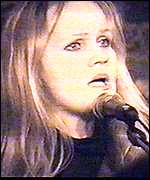
Photo: Eva had a cold the week she recorded at Blues Alley.
Question: Tell me about making that LIVE AT BLUES ALLEY album. Eva had a cold that week. It really was a cold? Some people wonder, was this an early symptom of the cancer.
AL DALE: Oh, no, no, she just had a cold, it wasn’t anything like that. But, being the singer that she was — a lot of singers, when they have a cold they’re just dead — she was able to pull it off even though she had a cold. But you can tell in her voice, you can tell something’s going on.
Before the show she was pacing in the dressing room upstairs, just anxiety, it’s almost like before a big prize fight, the fighters are up there going through whatever they have to do to get ready. We were talking upstairs before she had to go on, they said “OK, show time, time to go on,” and the band went down to set up. I went downstairs, I was just standing there, Chris comes up to me and says “Hey, Al, Al, Eva wants you to bring her on.” I said “Oh, OK,” so I went up on the stage and I brought her on. I didn’t know they were recording that, so when Eva was mixing, when we were doing the CD, she said she wanted it on there. That’s how I ended up on that recording, at the opening.
That started it, she got on stage, the place was packed, her parents were there, it was a really electrifying night.
|
“Let’s give a big Blues Alley welcome to Miss … Eva … Cassidy!” Opening the album LIVE AT BLUES ALLEY |
Question: The first night you recorded, I gather there was equipment failure.
AL DALE: Yeah, there were some glitches (laughs).
Question: So it’s the second night you’re talking about. At that point did you know the first night had been a failure?
AL DALE: Oh, no, I don’t think anybody knew until it was over. I don’t think it was a total loss, some of it was usable, but it was mostly the second night which was recorded. Now, what happened is, we were listening to the music a week later, we were talking about the songs, what would be on the album, it was just Chris and Eva and myself. All of a sudden she was going “I don’t like this.” I said, “It’s a live recording, people are going to expect a glitch here and there, that’s what happens when you do live, it’s not studio.” We were listening to it and Chris would say “What do you think of this song?” and she would say “No, no.” We went I don’t know how many hours, she was tearing up, she had been working that day and she was tired, coming from the nursery, so we just had to sit there and I said “Eva, look, it’s going to be great.” Chris said “Any glitches, I can fix.” Then the promise was that if we got this CD done, we would come right away and do a studio recording. That was like the promise. And she said “Oh…kay.”
So LIVE AT BLUES ALLEY was put together, and then I had to start getting it in the stores. It was all on consignment. I went to all the chains around the Beltway and started to get some of the stores to take it. There were some people reluctant to take even three CDs — you drive all the way to Fairfax Virginia and they only take three CDs! I had a conversion van and I folded down the back seat, put all the boxes I could fit in there, and just hit the road. Fortunately I was able to get it into all the Borders and Towers, all the major stores started to carry it.
Question: But it was only a few weeks after LIVE AT BLUES ALLEY was released, that Eva got sick.
AL DALE: Yes. As a matter of fact, on the night of the gig at Blues Alley in July, she was walking with a cane a little bit. She was already having problems with her hip. That night, I remember she had parked several blocks away, on K Street, away from the club, so I said “Let me give you a lift to your car.” I picked up her guitar amp, I made a comment to her, I said “Well, Eva, probably the problem with your hip is this amp, it’s so heavy, we’ve got to get you a roadie!” She never really wanted a roadie. I said “We’ve got to get somebody to help you with this amp, it’s probably been banging against your hip and you’re not even paying attention, maybe that’s what’s going on.” She said “I’m going to go to the doctor, I’ve got an appointment,” that was two or three days later.
And so then when they started to go through the tests, that’s when they found out….
then… then, uh, then you know, things happened…. what happened from there… After that, you know…
and we had to start preparing to have a memorial service for Eva, and stuff like that….
(Pause.)

So now, it was really (pause) kind of tough, we had just started doing the promotion on the CD, she wasn’t able to do any promotion. After she passed away, I was still running around the Beltway with it, people were still buying it. Even though it wasn’t national, it did well in the local market, sold a lot of copies, people were gravitating to it.
LIVE AT BLUES ALLEY, some people still think that’s a classic CD. The way it was done, live, not many artists in our day who are doing live CDs have done better. It’s just a great CD, and what happened is, that CD is the godmother of most of the stuff that’s out there, a lot of the songs on SONGBIRD, and the other CD [TIME AFTER TIME] came from the LIVE AT BLUES ALLEY dates.
Question: When Eva was alive she really didn’t have much success, she didn’t make much money, she didn’t have very large audiences. Can you talk about that a little bit?
AL DALE: I can remember her playing in small clubs and being a little bit frustrated, not at the size of the club or the size of the audience, but if there were distractions, people talking, not paying attention, that bothered her because her attitude was, if you wanted to talk, why are you here? And I think when she did have an audience like the Blues Alley audiences, and at the Wharf, and at the clubs that were more music rooms, I think she enjoyed that part of it. The gigs weren’t paying much money, at most of the clubs you’re getting a hundred dollars a night if that much, in some cases maybe enough to pay your gas bill and that’s it. I think the most money she ever really got was when we were doing the demo deals, the money for that she got in one lump sum, then of course you have to go out and record and do the other things.
Most of her success, honestly, has been since she passed away. That’s the really sad part, that she never had the opportunity even to enjoy the success of LIVE AT BLUES ALLEY. If she had lived, would everything be as big as it is, would it be larger than life like this? I think she would have gotten there. Maybe she’d be bigger than she is right now, because she’d be able to do the things where people could see her, do some promotion. It’s hard to know, would it still have happened, if she were still here. From a musical standpoint, her talent, her vocals and all that — yes. Whether or not that is something that she would be jumping up and down and saying “Let’s put on this fur coat, go to Europe, see the queen,” I don’t think that would have happened. She would have made the trip, gone around and talked to folks, but it would have been in her own way.
Question: How do you think she would have felt about this success?
AL DALE: In terms of her reaction to people really liking her music, going in the stores and buying it, I think that would have been a pleasing moment in her life. I don’t think it would have BEEN her life totally. If she could do it and then get away and do other things, that would be ideal, I think that all this going on now would have been like “I don’t understand what’s going on, what the big fuss is about.” But prior to her passing away, she knew that people were really genuinely looking at her as a talent, and when she would go out and perform live, people would really go bonkers, applaud and everything. That started to resonate with her, and I think that at least before the tragic thing happened, she had an opportunity to know that “People really do like what I do,” that was really good for that to happen.
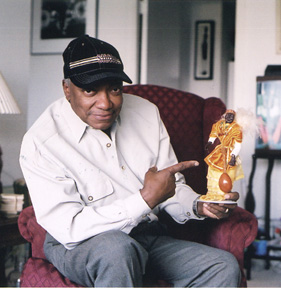 Al Dale in 2001 Eva made this “black angel” for his Christmas tree. Al told NPR “Morning Edition” about it (see the Radio and Television page) |
I think as time goes by, you’re going to hear more and more artists sort of emulating Eva, like Eva was singing other people’s stuff, they’re going to be singing Eva’s arrangements of the songs that she sang. I think that’s definitely going to be one of the things that’s going to happen. In fact, I was looking at one of the music shows on television, one of those MTV awards or one of those things, and a group came out and they started their performance with Eva’s version of that gospel thing, “How Can I Keep From Singing.” Now that’s an influence, and this was a kind of a rock group, and I’m going “Man, this is great.”
I think about all the people that I brought in from the record labels, and everywhere else, and how they couldn’t see it, they couldn’t hear it, or they couldn’t get beyond the little thing that says “She’s got to be pop, or blues,” I think about how they missed the boat. I think those people look back on it now and say “Man, that was a big mistake.” I haven’t really had any dialogue with them about it, but they can’t help but think, “Man, did I blow this one.” So right now, in a way I feel real good, I feel real good for Chris Biondo, I feel real good for myself, because I think, you know, just hanging in there a number of years, saying “Hey, Eva, you’re going to make it, you’re going to be great one day, everybody’s going to know, and then to have it happen, that’s the reward for me.
I think it’s a good thing for other artists out there, who are striving to be somebody, and they have a certain style, or a certain way they dance, or a certain way they sing, or whatever they do in the arts. Just believe in what you do, and continue to get better. Eva did that, she started at one level, she started here in my basement on a video. At some point, she progressed to where she could do a LIVE AT BLUES ALLEY, and kept going, and so that just tells people, if you hang in there and you believe in what you do, there is a market out there for you. It may not be a global market, you might not make a billion dollars, but it might make you the happiest artist you could ever be.
Question: Thank you, Al, for talking to me.
UPDATE: Alfonzo “Al” Dale died in Maryland on March 8, 2017, at age 80.
Copyright 2001 by Laura Bligh. Edited 2015 and 2017. Journalists, if you want to use sections of this interview for an article about Eva, please ask for permission.
